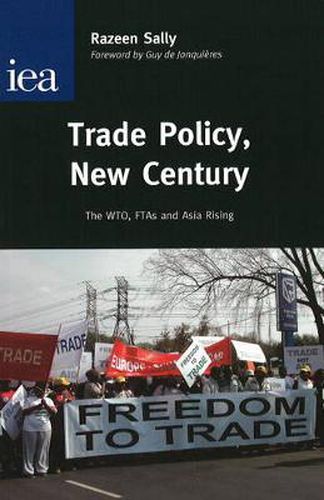Readings Newsletter
Become a Readings Member to make your shopping experience even easier.
Sign in or sign up for free!
You’re not far away from qualifying for FREE standard shipping within Australia
You’ve qualified for FREE standard shipping within Australia
The cart is loading…






In recent years, debates on international trade policy have focused on the role of the World Trade Organization and the two big political and economic powers - the USA and the EU. In this book, the author, an expert in trade policy, argues that this focus must change. Large supra-national institutions have become bogged down and are no longer in a position to drive trade liberalisation. Also, the world’s fastest growing economies are those Asian economies that have embraced free trade, in many cases going beyond international requirements. Asian countries - China most conspicuously - have been taking the initiative by pursuing free trade unilaterally. This must continue and spread. The Western developed economies should respond by removing their own protectionism. Unilateral action, not trade negotiations, is the key: the world cannot wait for the WTO. If a unilateral commitment to free trade is to stick, it must be fixed in a general attitude of economic liberalism in the domestic economy. This applies as much to newly emerging economies as to the USA and the EU. In this tour de force of international trade policy, Razeen Sally is realistic about the ability of existing institutions to deliver free trade ‘from above’, but optimistic about the prospects for the world economy as a result of unilateral liberalisation ‘from below’.
$9.00 standard shipping within Australia
FREE standard shipping within Australia for orders over $100.00
Express & International shipping calculated at checkout
In recent years, debates on international trade policy have focused on the role of the World Trade Organization and the two big political and economic powers - the USA and the EU. In this book, the author, an expert in trade policy, argues that this focus must change. Large supra-national institutions have become bogged down and are no longer in a position to drive trade liberalisation. Also, the world’s fastest growing economies are those Asian economies that have embraced free trade, in many cases going beyond international requirements. Asian countries - China most conspicuously - have been taking the initiative by pursuing free trade unilaterally. This must continue and spread. The Western developed economies should respond by removing their own protectionism. Unilateral action, not trade negotiations, is the key: the world cannot wait for the WTO. If a unilateral commitment to free trade is to stick, it must be fixed in a general attitude of economic liberalism in the domestic economy. This applies as much to newly emerging economies as to the USA and the EU. In this tour de force of international trade policy, Razeen Sally is realistic about the ability of existing institutions to deliver free trade ‘from above’, but optimistic about the prospects for the world economy as a result of unilateral liberalisation ‘from below’.